Constructive Memory: We Can't Even Trust Our Own Memories! This Is How Our Brain Tricks Us
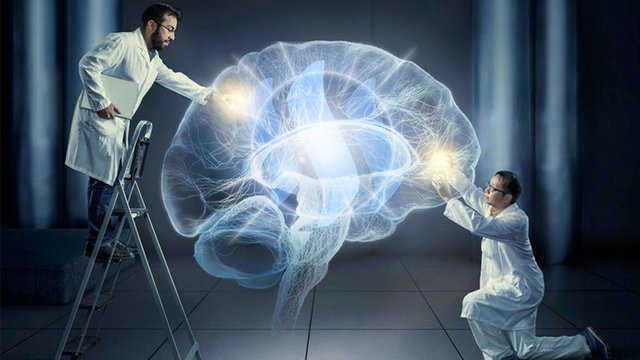
We think of our own experiences and memories as a very reliable source of Information, right?
"I've seen it with my own eyes" is one of the most convincing statements, and eye-witnesses play an important role in many trials.
But can you actually trust your memory? How do you know if something you think you saw actually happened in the exact same way?
This might sound like a strange theory at first, but countless studies have shown that our memories can actually be altered - and in many cases, people would swear to remember something that actually never happened!
We often think that our memories are set in stone - but actually, they can be altered all the time.
Some scientists even suggest tht we change old memories every time we recall them.
Memory is processed in many different areas of our brain, and there are also many different kinds of memory - procedural memory for example is learning a skill like walking, talking or riding a bike, and after a while you can do it so well that you don't even have to think about it anymore. These types of memories cannot be changed.
What we will refer to in this post is episodic memory - memories of events!
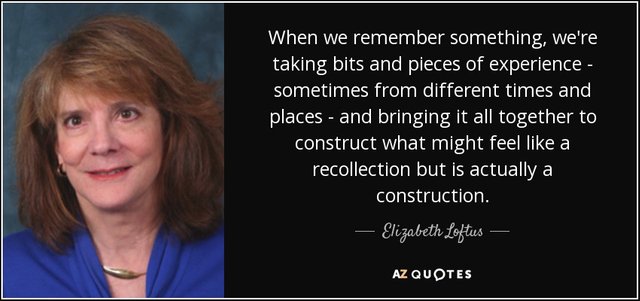
To show that these types of memories can't always be trusted, let's look at some interesting scientific studies. All of these were conducted by Elizabeth Loftus, the leading psychologic scientist in this field of "constructive memory":
1.)
In the first study, the subjects were shown videos of a simulated car crash, and after that they were intervirewed about the crash.
The scientists then used different words to interrogate the questions - for example, they asked one group how fast the cars were going if they "hit" each other, and they asked the other group how fast they were when they "smashed into" each other.
Interestingly, the words used in the question totally influenced the subject's perception of speed:
The group where the word "hit" was used answered with 34 mph, while the group that heard the question with "smashed" said the cars were going 41mph.
Also, some subjects from the last group reported seeing broken glass at the site of the accident, when there never was any.
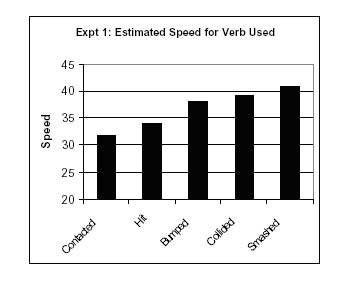

2.)
For this study, subjects were shown an accident when a car crossed an intersection with a stop sign.
When the scientists later questioned the subjects about the video, and they mentioned a yield sign, the subjects suddenly remembered a yield sign being there at the intersetion - not a stop sign.
3.)
This is one of the most popular studies - the so-called "in the mall" study:
The scientists contacted test subject's family members and asked them about 3 events that happened in the subject's childhood - for example having a clown at a birthday party, going on a special family trip etc.
The scientists then interviewed the subjects about how well they remembered those events - but they added one fake story: they asked the subject something like "your mom told me you got lost in the mall one day as a toddler, was that a scary experience?" when in reality, this never actually happened to any of the subjects.
Surprisingly, 29% of them actually said that they remembered this event, and even included more details to the story.
Even the real events were only recalled 68% of the time, so the fake story was remembered nearly half as often as an actual memory! That's crazy!
Different other studies from all over the world have shown that if you plant childhood memories into people's minds, they started to believe them and even add more details to it.
And this was even true with traumatic experiences like nearly drowning, or being attacked by an animal - still, over half of the subjects believed that the fake memory was actually their own.
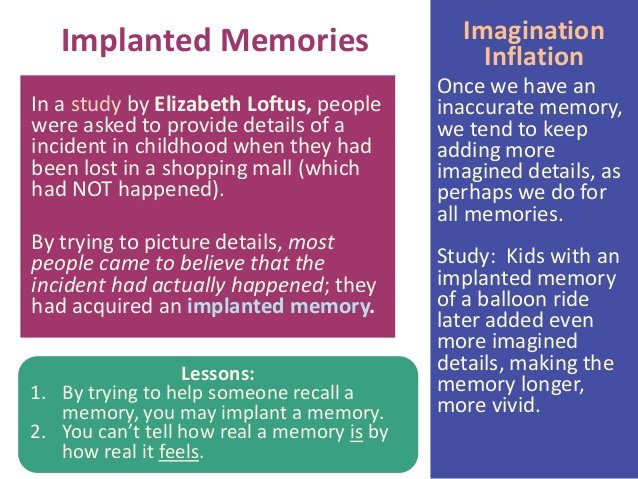
Now you might think that these were all not very stressful or important situations, and that our brains might function differently when it's a dangerous situation.
This has been tested as well:
A test for people in the military simulated a stressful situation that should teach them how being captured as a prisoner of war could be like.
They were interrogated for 30 minutes in a very aggressive way, even with some slight physical abuse, and in very stressful conditions.
Afterwards, they were asked to identify the interrogator.
When the scientists fed the subjects even the slightest suggestive information, they often said that a certain person was the interrogator, who didn't even look similar to the real one.
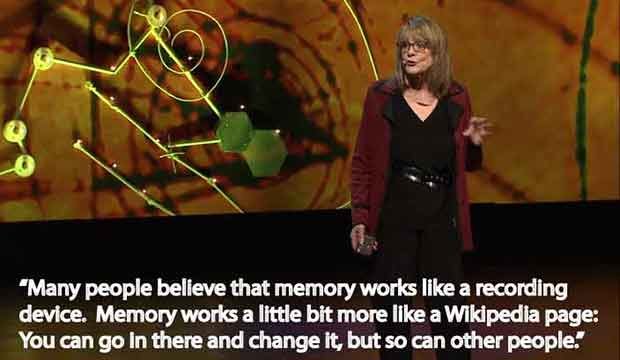
Do altered memories change your present and future?
The subjects of this study were implanted with the memory that they had gotten sick from a certain dish as a kid - this could be pickles, hard boiled eggs or even ice cream. The stories were totally imaginary!
When the scientists later tested the subjects at a picknick, they observed what the subjects chose to eat - and they were much less likely to pick a food from the negative imaginary memory.
And this worked the other way around as well: when the scientists had implanted them with a positive, happy memory about a healthy food like aspargus, it made the subjects want to eat asparagus more!
If you're interested in the topic, please watch this TED Talk from Dr. Loftus herself, where she explains her work and the studies again in detail:
Conclusion and Ethical Problems
So in conclusion, our memories are much less reliable than we think.
They can easily be altered if a person tells us a different story in a convincing way.
And in stressful situations, we can trust them even less!
This awareness brings some ethical questions with it -
Should we change the laws for eye-witnesses in trials? Should their testimony have less impact on the verdict?
And should we use this knowledge to our advantage? For example, implanting a happy memory about healthy foods and sports in an obese person? Or altering the memory of someone who suffers from anxiety, to make them less scared?
What's your opinion on this ethical dilemma?

© Sirwinchester
Thanks to your article I know more about how our brain deals with memories. Indeed understanding our brain has long been a hot topic in neuroscience. From a non technical point of view, I do think altering memories in some occasions is good to humans, if those memories can only cause sorrow and hard feelings.
Hey The Effort you have done for creating this blog post is very apprecitet . I am watching your posts and getting inspire that your doing a good work for the community by developing a good and valuable content .My Name is Sophia Olive I am really intrested into your posts and hopping and wating for more valuable content . Have a great day Man
That is something else how human brains think something is worse off, just because of the word we use. That is why attorneys get paid the big bucks to word things in a certain ways to paint pictures......Nice post.
I can vouch for this, I remember having remembered having heard it once.
It is also said that the media alter public opinion by manipulating various things in our minds.
check this out

ohhk
I read that text but not sure I can believe the information, maybe after all my brain just fabricated that whole article, maybe even Steemit so that I can be on social media, think I can earn money posting and commenting, and not feel guilty.
I might still just be a caveman tricked by his brain into thinking he lives in a more evolved world in order to cope with the hardships of prehistoric life. Who knows.
It's crazy to think that something we rely on so heavily can be so unreliable!
That's why it is difficult to take "history" in its complete literal sense.
The world can only be perceived through our limited perception which is constantly changing due to inner and outer stimuli!
How I like to approach things, is by understanding that the past and our memories are only relative to our experience therefore little "truth" exists in what we remember.
Being in the present moment relinquishes most of the issue caused by relying too much on the past. It should only ever be used when it can be of aid in the present moment :)
So true
Intelligent and well put together article, keep them coming brother!! posts like these keep this platform rich!
Awesome bro... Thanks.
Try this game: Ask people these questions, in this order: "What's 1+1? What's 2+2? What's 4+4? What's 8+8?" Then ask them to name a vegetable. They almost always say carrot.
I didn't even know carrot is a vegetable